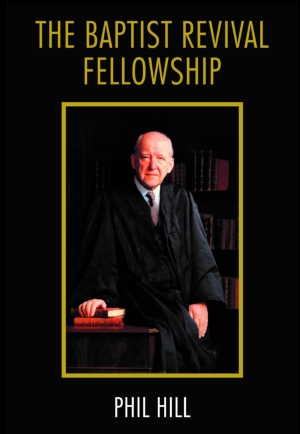The Baptist Revival Fellowship by Phil Hill
Phil Hill’s book fills an important gap in 20th century Baptist history
 The Baptist Revival Fellowship (1938-1972): A Study in Conservative Evangelicalism
The Baptist Revival Fellowship (1938-1972): A Study in Conservative Evangelicalism
By Phil Hill
London: Apostles, 2017
ISBN: 978-1910942680
Reviewed by Andy Goodliff
This is the first extensive study of the Baptist Revival Fellowship (BRF), which was a conservative evangelical grouping within the Baptist Union that had a good size following. Its story in detail as never before been told, outside of its mentions in Ian Randall’s English Baptists of the Twentieth Century. Phil Hill’s book fills an important gap in 20th century Baptist history. It was written first as an MPhil thesis and has now made more widely available. ?
Hill’s history charts the beginnings of the BRF as a movement for spiritual renewal, with links to Keswick. It was founded by Theo Bamber and Geoffrey King. During the 1960s under Earnest Payne’s leadership of the Baptist Union as General Secretary, the BRF became more critical of what they perceived as moves towards denominational centralisation and greater ecumenism. A third chapter then explores the story of how the BRF began to move towards succession from the Union, which climaxed in the controversy associated with Michael Taylor’s address to the Baptist Union Assembly in 1971. On this Hill provides to date the most in depth account of that controversy (although an account from Taylor’s perspective remains untold) and the aftermath which ran into 1972. It was at this moment members of the BRF left the Union.?
What began as a movement for renewal and revival amongst Baptists, from a conservative starting pointing, ended in what Hill calls failure, due in part to the leadership of Bamber, and antagonistic relationship with the Union’s leadership. It was just under a decade later that Mainstream was born, another Baptist evangelical grouping, which ultimately was much more effective in influencing the Union, largely because it chose to approach the Union as those committed to it, rather than with suspicion.?
There is no conservative evangelical grouping amongst Baptists anymore, at least, in any organised sense, with Baptists in the 1990s onwards opting for a more open activist evangelicalism. Hill’s story of the BRF provides some of the reasons why.?
For those interested in the story of Baptists in the 20th century, Hill’s book is a welcome addition. Whether we might find ourselves sympathetic to the BRF or not, their story is an important one in understanding some of the directions Baptists have gone since. For example, without the BRF, the BU’s position towards ecumenical engagement might have been bolder and more committed, although its lukewarm response was a step too far for many in the BRF.
Hopefully Hill’s study will encourage others to engage in further research of the period in question, which remains still largely untold. An assessment of the Ernest Payne years is perhaps now due. Baptists today, as Hill’s book shows, can learn a lot from understanding the story of their forebears in the 20th century. The set of issues might now be different, but the difficulties of how tensions and differences within the Union are handled, remain present.
Andy Goodliff, minister Belle Vue Baptist Church, Southend-on-Sea
Baptist Times, 13/09/2018